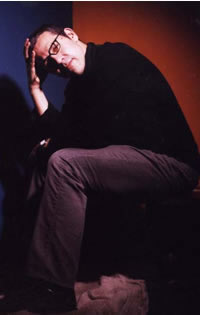One year after winning the inaugural $100,000 Elinore & Lou Siminovitch Prize in Theatre, for which he was hailed as one of the brightest lights in Canadian theatre, Daniel Brooks (BA 1981 UC) admits to feeling trepidation.
The 44-year-old director and writer has a lot of questions about the role of art in what he calls an “anti-intellectual world.” He’s considering a few plays he might direct next, all the while questioning his role in theatre; he’s contemplating a move into television, while questioning its impact as an artistic medium.
And these days, Brooks is even questioning himself: “I feel that I’m sort of remaking myself.” Still mulling over the Siminovitch prize, awarded to a mid-career director, playwright or designer who has made a significant contribution to Canadian theatre, he says, “It’s a major event in one’s life. I can’t just say, ‘Oh, that’s great,’ and move on. It changes the psychic landscape, how one is perceived.”
The Toronto-born Brooks admits to performing an elaborate, high-angst dance with destiny every time he chooses a project. “I spend as much time thinking about what work I might be doing as actually doing it,” he says during a chat in his sparse office at Toronto’s Tarragon Theatre, where he is artist-in-residence. “Some might call it neurotic, even puerile, but I worry that decisions made now will have an enormous impact on the future.”
Indeed, Brooks’ decisions sent a charge through the Toronto theatre scene in the ’90s. He has been a key creator with two of the city’s most exciting theatrical companies: the Augusta Company and da da kamera. Emphasizing a collaborative and experimental creative process, the companies produced critically acclaimed work (Here Lies Henry, The Soldier Dreams and 86; An Autopsy) and helped nurture the talents of Don McKellar and Daniel MacIvor, both prominent actors/writers/directors. Brooks emerged with an enviable reputation (Dora Mavor Moore and Chalmers awards) as a director and co-writer of complex, ideas-driven pieces that engage audiences emotionally. Yet he remained steadfastly – one might even say stubbornly – dedicated to independent theatre.
“For me, every project has to be different or it will fall inside conventional boundaries,” says Brooks, who initially enrolled in sciences at U of T, then switched to UC’s drama program. “Originality can only happen when one begins with the love of individual expression and allows it to lead to collective expression.”
It’s a time-consuming process that Brooks finds increasingly difficult to pull off in the cash-starved theatre system and the current social climate, where “everything is bottom line.” But he questions a move into TV, where there’s more money. “My theory is that social activism on TV is self-defeating because it creates the illusion of action. The viewer has already experienced the act by watching TV, so it undermines the will to engage in public life.”
Do I risk asking another question? Brooks laughs. “I’ve always struggled with the point and reason for things. That’s an ongoing struggle.”






